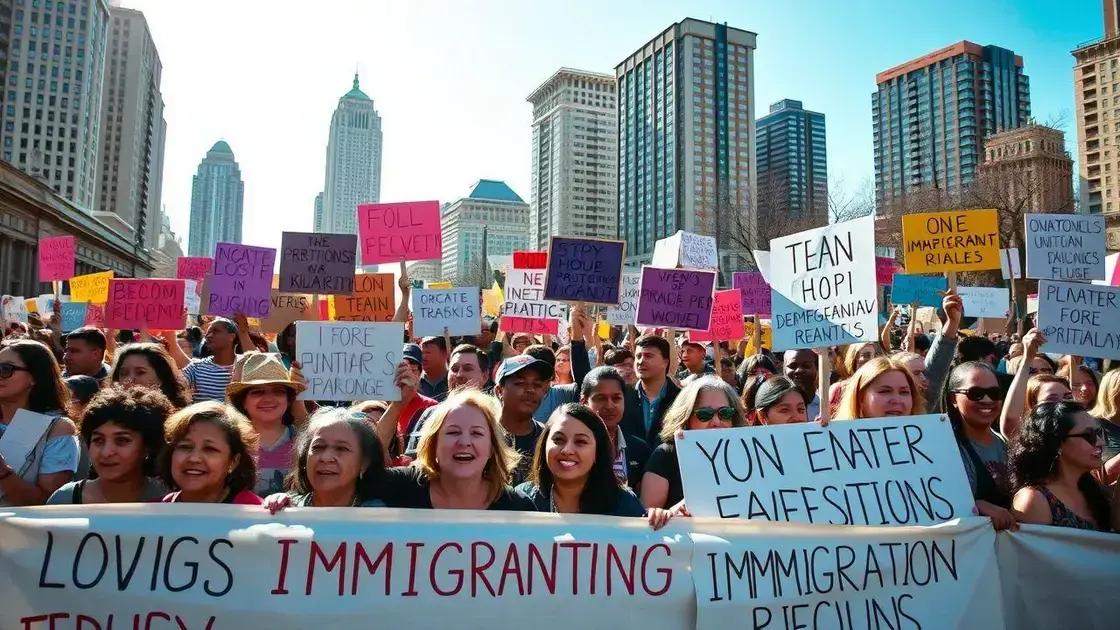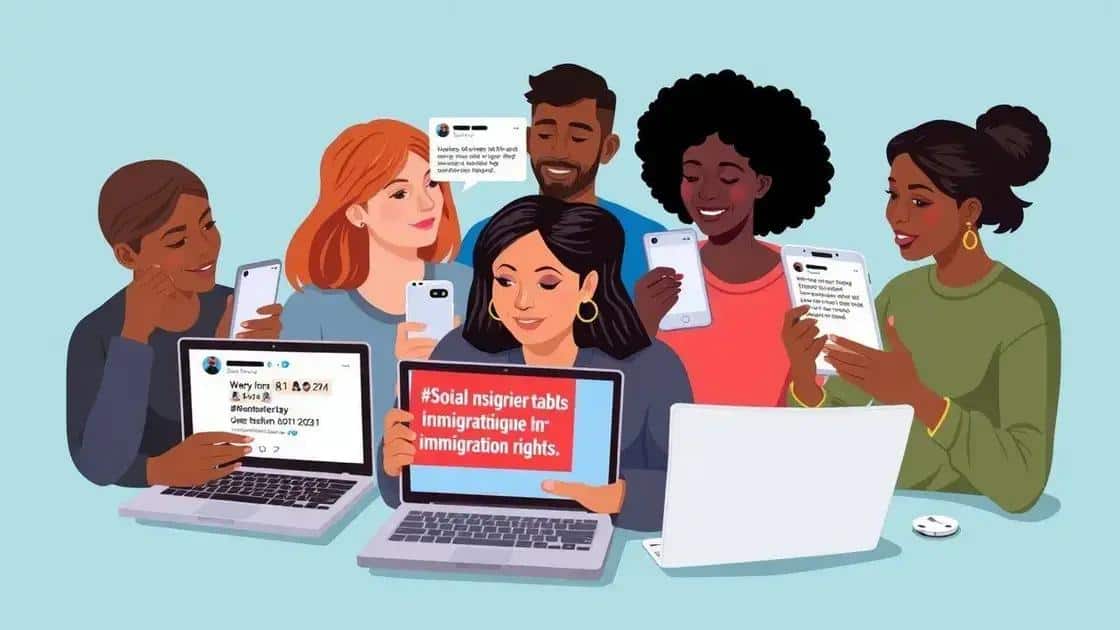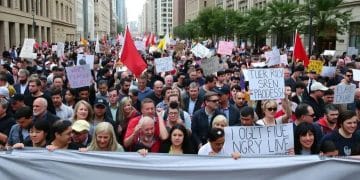Immigration rights demonstrations escalate in April 2025

Anúncios
Immigration rights demonstrations are vital for advocating fair policies, raising awareness, and mobilizing communities to support the dignity and rights of immigrants across society.
Immigration rights demonstrations escalate in April 2025, drawing attention to critical issues affecting communities across the country. What sparked this urgency, and how are individuals coming together to make their voices heard? Let’s dive into this significant movement.
Anúncios
Key events leading up to the demonstrations
In the lead-up to the immigration rights demonstrations of April 2025, several key events sparked heightened awareness and mobilization among communities. Understanding these events helps clarify why the demonstrations became such a pivotal moment in advocacy for immigration reform.
The Rise of Local Advocacy Groups
Over the past few years, local advocacy groups dedicated to immigration rights have gained momentum. These organizations focus on educating the public about the challenges faced by immigrants and continuously push for policy changes. Their grassroots efforts have been instrumental in organizing demonstrations that culminated in 2025.
Anúncios
Policy Changes and Public Response
Changes in immigration policies have led to public outcry. Many families were affected by new regulations, causing fear and a sense of urgency within immigrant communities. Public forums and town hall meetings highlighted these issues, allowing citizens to voice their concerns. This grassroots activism set the stage for the demonstrations, as more people began to understand the impact of these policies.
Social Media Campaigns
Social media played an essential role in mobilizing support for these events. Hashtags associated with immigration rights gained traction, allowing individuals to share personal stories, rally support, and inform others about upcoming demonstrations. The online movement helped bridge various communities, uniting them under shared goals.
Key Dates to Remember
- January 2025: Local advocacy groups hold a major rally to protest new immigration policies.
- February 2025: A viral video highlighting the struggles of immigrant families circulates on social media.
- March 2025: Town hall meetings organized across the country to discuss the implications of the new policies.
- April 2025: Nationwide demonstrations are planned, with cities gearing up for significant turnout.
These events illustrate a chain reaction that culminated in a powerful display of solidarity among various communities during April 2025. Each step contributed to raising awareness and emphasizing the need for change.
Profiles of prominent activists and speakers
Among the voices of the immigration rights demonstrations, several prominent activists and speakers have emerged as powerful advocates for change. Their stories inspire many and highlight the struggles and triumphs that resonate with communities nationwide.
Maria Gonzalez
As a leading figure in the movement, Maria Gonzalez has tirelessly fought for immigrant rights for over a decade. Her personal journey as an immigrant fuels her passion, making her a relatable and inspiring figure. Maria has organized numerous rallies and is known for her ability to unite diverse groups.
Dr. Ahmed Khan
Another prominent voice is Dr. Ahmed Khan, a respected scholar and speaker. He uses his platform to educate the public on the impact of immigration policies on families. Dr. Khan often shares statistical evidence in his talks, emphasizing the need for informed activism. His educational approach helps people understand the complexities of immigration.
Lisa Chen
Lisa Chen has become a recognizable name through her social media activism. Her online campaigns have reached millions, making her a crucial part of the dialogue surrounding immigration rights. By sharing personal stories and engaging directly with followers, Lisa raises awareness about the challenges immigrants face through relatable content.
Summary of Contributions
- Maria Gonzalez led major immigration rallies, attracting significant media attention.
- Dr. Ahmed Khan’s educational sessions provide critical insights into policy impacts.
- Lisa Chen uses social media to tell powerful stories that resonate with younger audiences.
The contributions of these activists play a vital role in the ongoing struggle for immigration rights. Their advocacy not only serves to strengthen movements but also to encourage a new generation of activists.
Impact of social media on mobilization

The impact of social media on the mobilization for immigration rights has been profound and transformative. It has changed how people connect, share information, and rally for change, particularly during key moments like the demonstrations in April 2025.
Rapid Information Sharing
One of the main benefits of social media is its ability to spread information quickly. Posts about events and important updates can reach thousands of people in minutes. Activists use platforms like Twitter, Facebook, and Instagram to share news on upcoming rallies. This fast-paced communication helps to engage more supporters and raises awareness about immigration issues.
Building Community
Social media has also played a crucial role in creating communities around immigration rights. People can connect with others who share their experiences and struggles. Online forums and groups provide a safe space for discussing issues and brainstorming ways to take action. This sense of community can motivate individuals to participate in demonstrations and other forms of activism.
Influence of Viral Campaigns
Some social media campaigns have gone viral, capturing national attention. These campaigns often feature personal stories, compelling visuals, and strong calls to action. When people see others sharing their narratives, they can feel a deeper connection to the cause. Viral content encourages users to take a stand, share it with their networks, and participate in events.
Successful Strategies
- Engaging visuals attract more attention and shares.
- Using hashtags helps unify posts under a common theme.
- Collaborating with influencers can expand reach exponentially.
- Regular updates keep followers informed and engaged.
The role of social media in mobilization reveals how technology can empower movements and amplify voices that might otherwise go unheard. By providing tools for rapid communication and the creation of community, social media has become an essential aspect of grassroots organizing, especially in the context of immigration rights.
Legal implications of the demonstrations
The legal implications of the demonstrations surrounding immigration rights are significant. These events highlight both the challenges faced by activists and the legal frameworks that govern public protests.
Understanding Public Assembly Laws
Public assembly laws are crucial during demonstrations. Activists must understand their rights to gather and express their views. Most countries protect the right to peaceful assembly, but there are regulations to consider. Local ordinances may require permits for large gatherings, which can impact how protests are organized.
Challenges of Law Enforcement
Law enforcement often plays a central role during demonstrations. While some officers assist in facilitating protests, others may respond with force if they believe laws are being violated. This can lead to arrests, injuries, or even accusations of police misconduct. Observers have raised concerns about heavy-handed tactics used against peaceful protesters, emphasizing the need for accountability.
Legal Support and Resources
Many organizations provide legal support for individuals involved in demonstrations. Activists can access resources that inform them of their rights and the legal processes involved. This support is essential, especially if individuals face arrests or legal action stemming from their participation in protests.
Key Legal Considerations
- Know your rights regarding peaceful assembly and speech.
- Understand local regulations about permits and public gatherings.
- Be aware of how law enforcement may respond during protests.
- Access legal aid organizations for support if needed.
Being informed about the legal landscape can empower activists and help ensure that their voices are heard without unnecessary legal repercussions. As the immigration rights demonstrations continue to evolve, understanding these legal implications is vital for effective advocacy.
Ways to support immigration rights
Supporting immigration rights is crucial for fostering equality and justice in society. There are many effective ways that individuals and communities can get involved and make a difference.
Volunteer with Local Organizations
One of the best ways to support immigration rights is by volunteering. Many organizations focus on helping immigrants navigate legal systems and access resources. By offering your time and skills, you can help these groups provide essential services.
Advocate for Policy Changes
Advocacy plays a significant role in promoting immigration rights. You can contact local representatives to express your support for fair immigration policies. Joining advocacy campaigns can also amplify your voice. Attending town hall meetings or virtual forums enables you to engage with decision-makers.
Educate Yourself and Others
Understanding the complexities of immigration issues is vital. Reading books, watching documentaries, and attending workshops can enhance your knowledge. Share what you learn with friends and family, as educating others helps spread awareness about the importance of immigration rights.
Participate in Demonstrations
- Join local protests and rallies advocating for immigration rights.
- Use your presence to show solidarity with affected communities.
- Bring friends along to increase turnout and support.
- Share photos and updates on social media to raise awareness.
Every action counts, whether you volunteer, advocate for policy changes, educate, or participate in demonstrations. Collective efforts can lead to meaningful change in the fight for immigration rights. When communities unite, their voices can demand a fair and just society for all.






